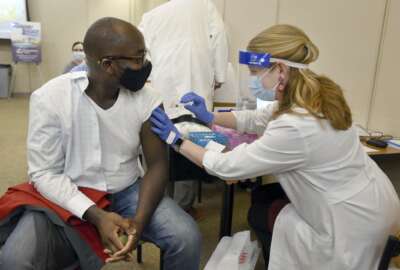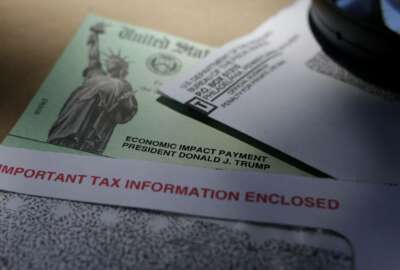
Va. congressman wants to know vaccination plans for federal employees
In today's Federal Newscast: Rep. Don Beyer (D-Va.) wants to know when and how Federal Employees will get vaccinated. The reenlisted rate in one branch of the...
To listen to the Federal Newscast on your phone or mobile device, subscribe in PodcastOne or Apple Podcasts. The best listening experience on desktop can be found using Chrome, Firefox or Safari.
- Rep. Don Beyer (D-Va.) wants clarity on the plan to distribute COVID-19 vaccines to the federal workforce. Beyer wrote a letter to National Security Adviser Robert O’Brien, Health and Human Services Secretary Alex Azar, and Office of Personnel Management Acting Director Michael Rigas stating, “After weeks of no substantive response to my staff’s inquiry, I write to request any and all COVID-19 vaccine distribution plans or guidance for federal employees.” He also wrote a letter to Centers for Disease Control and Prevention Director Robert Redfield, asking for more transparency and data sharing on the national effort to distribute and administer vaccines.
- The Senate is expected to register a two-thirds vote later this week to override President Donald Trump’s veto of the 2021 National Defense Authorization Act. The chamber is widely expected to pass the bill over the president’s objections, as the House did on Monday. Sen. Bernie Sanders (D-Vt.) is blocking a speedy vote over Majority Leader Mitch McConnell’s refusal to bring a larger COVID-19 stimulus package to the Senate floor. The Senate approved the NDAA earlier this month by a vote of 84-13, well above the supermajority-threshold needed to override a veto. (Federal News Network)
- Trump’s veto of the 2021 defense authorization act could affect the pay of service members and health professionals. The National Defense Authorization Act has passed 59 years in a row and it usually gives a raise to the military and extends special pay for certain occupations. If the Senate cannot override the president’s veto before Jan. 3, all of that could be in jeopardy. The military may not get a 3% raise, military nurses going to school will lose stipends and incentive pay to keep highly talented troops in the service will disappear. Some benefits will also go by the wayside like free national park passes for Gold Star families and priority housing for military spouses providing daycare. (Federal News Network)
- The IRS is wasting no time distributing the latest round of COVID-19 relief funds. The Treasury department said the IRS started processing direct deposits yesterday, just two days after Trump signed the spending package Congress passed earlier this month. Paper checks will start to go out in the mail today. There will be one-time payments of $600 for most Americans unless Congress approves an additional package backed by the president and some lawmakers.
- Amid a tough private sector job market, the Navy saw big gains in the number of sailors who chose to reenlist in 2020. Navy officials thought their 2019 retention rates were “outstanding,” but this year’s numbers beat them handily. In the service’s youngest and largest cohort — those with less than six years of service — 69% of sailors eligible to reenlist chose to do so. That is compared to a goal of 57% the Navy set for 2020. The Navy saw similar gains in older age groups and beat its own retention targets by at least seven percentage points in every category.
- Womack Army Medical Center in North Carolina will join other military installations as the newest testing ground for coronavirus vaccines. It will participate in the phase three clinical trial of the American-made Novavax vaccine. Novavax is the third coronavirus shot developed in the United States to battle COVID-19. The trial calls for 30,000 participants in the U.S. and in Mexico. Other bases involved in the trial include Naval Medical Center San Diego in California and Walter Reed National Military Medical Center in Maryland.
- Train transportation in the United States is safer now, thanks to completion of a long-standing federal project. The Federal Railroad Administration, part of the Transportation Department, said a technology called positive train control is now in place nationwide. Congress had set a deadline of Dec. 31 for the 12-year project. It covers more than 57,000 miles of freight and passenger track and the locomotives of 41 railroads, including Amtrak, Virginia Railway Express and MARC. Positive train control uses sensors, networks and on-board controls to help keep trains from colliding, derailing or going too fast. Transportation Secretary Elaine Chao said getting the controls installed everywhere mandated by Congress was a top priority.
- Democrats on the House Oversight and Reform Committee get another shot at getting Trump Hotel documents from the General Services Administration. A three-judge panel on the U.S. Court of Appeals for the D.C. Circuit is sending the committee’s case back to the lower courts to decide the merits of the document request. A D.C. federal court dismissed the lawsuit in August 2018 on procedural grounds. Lawmakers asked for monthly statements of the hotel’s revenues and expenses and correspondence between GSA and the Trump transition team.
- The IRS recovered nearly $500 million in fiscal 2020 thanks to its whistleblower program. The agency made awards to more than 160 whistleblowers worth nearly $87 million. But the IRS whistleblower office said that recovery of funds is the lowest level it has seen in three years. The agency, for example, recovered more than $1.4 billion in 2018 thanks to whistleblower tips. Since 2007, the whistleblower office has recovered more than $6 billion in taxes owed and has paid out more than $1 billion to whistleblowers.
Copyright © 2025 Federal News Network. All rights reserved. This website is not intended for users located within the European Economic Area.
Peter Musurlian
Peter Musurlian is a producer at Federal News Network.
Follow @PMusurlianWFED
Related Stories
(AP Photo/Eric Gay)

Agencies get more help distributing COVID-19 relief in $2.3T catch-all
Related Topics
2021 NDAA
Alex Azar
All News
Benefits
Centers for Disease Control and Prevention
Covid-19
COVID-19 vaccine
Don Beyer
Donald Trump
Federal Drive
Federal Newscast
federal pay raise
Federal Railroad Administration
federal workforce
General Services Administration
health care
IRS
Michael Rigas
NDAA
Novavax
Pay & Benefits
Robert O’Brien
Robert Redfield
stimulus
Tom Temin
Transportation Department
Trump Hotel
whistleblower
Workforce



